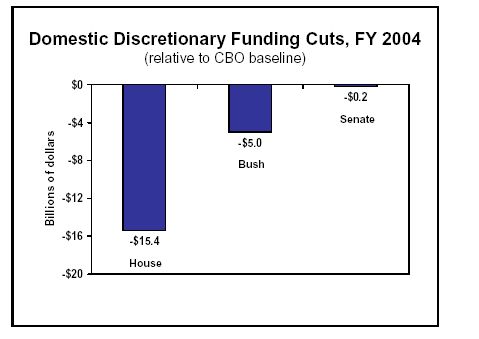FUNDING LEVEL IN HOUSE
BUDGET WOULD LIKELY LEAD TO CUTS TO HOUSING ASSISTANCE
FOR LOW-INCOME
FAMILIES CONSIDERABLY MORE SEVERE THAN
THOSE PROPOSED IN THE PRESIDENT’S BUDGET
by
Barbara Sard and Will Fischer
| PDF of this report |
| If you cannot access the files through the links, right-click on the underlined text, click "Save Link As," download to your directory, and open the document in Adobe Acrobat Reader. |
If the House-Senate conference committee that is currently meeting approves a reduction in domestic discretionary funding in fiscal year 2004 below the level the President requested, it will be difficult for Congress to restore the cuts in low-income housing assistance proposed in the President’s budget. Instead, there will be a strong chance that Congress will add further cuts in housing assistance on top of those the President proposed. By contrast, if the conference approves the Senate level for domestic discretionary programs, chances of averting cuts in the housing programs in fiscal year 2004 will be greatly improved.
President’s Budget Requests Large Cuts in Low-Income Housing Assistance
The President’s budget proposes a reduction in overall funding for domestic discretionary programs of $5.0 billion in fiscal year 2004, compared to the Congressional Budget Office baseline (which equals the 2003 funding levels for these programs adjusted for inflation). Of this reduction, more than $1.6 billion — about one-third of the total — would come from cuts in programs that provide housing assistance to the lowest-income families: housing vouchers, project-based Section 8 assistance and public housing. When other cuts in housing and community development programs contained in the President’s budget are included, the total of these reductions amounts to approximately $2 billion, or 40 percent of the proposed reduction in domestic discretionary programs.
These cuts would leave local housing agencies with inadequate resources to maintain public housing and start to address a backlog of more than $20 billion in repair and modernization needs at public housing developments. Such underfunding would jeopardize the nation’s investment in public housing, threaten the well-being of low-income residents that depend on it — about half of whom are elderly or disabled — and reduce the number of public housing units available to serve poor households waiting for assistance.
House Budget Would Slash Funding for the Part of the Budget that Includes the Housing Programs
The budget that the House of Representatives has approved would more than triple the overall funding cut sought by the President in domestic discretionary programs in fiscal year 2004. The Bush budget would cut overall funding for domestic discretionary programs in fiscal year 2004 by $5 billion, compared to the CBO baseline. The House budget cuts overall funding for domestic discretionary programs in 2004 by $15.4 billion.

The Senate, by contrast, approved a budget that restores most of the funds the President would cut in the domestic discretionary program area in fiscal year 2004 (although the Senate budget assumes significant cuts in this part of the budget in subsequent years). The Senate budget shrinks the cuts in the overall level of funding for domestic discretionary programs in fiscal year 2004 to just $0.2 billion. A House-Senate conference committee that is currently meeting will determine the funding level in the final budget.
The funding category of domestic discretionary programs includes many other programs in addition to the low-income housing assistance programs, and the budget that Congress will approve in the next 10 days or so will not specify funding levels for individual programs. Nevertheless, the overall level of funding provided for domestic discretionary programs in the budget that emerges from conference will be one of the most decisive factors in determining whether Congress provides adequate funding for low-income housing assistance when it writes the fiscal year 2004 appropriations bills later this year.
If the overall reduction in domestic discretionary funding in the budget that the conference committee produces is larger than the cut contained in the President’s budget, it will be hard to restore the funding reductions in the President’s budget in programs like HOPE VI and the housing voucher program. Instead, there will be a strong chance that Congress will impose cuts in housing programs significantly deeper than those the President has recommended. Such cuts would reduce the capacity of these programs to provide needed assistance to low-income families and elderly and disabled individuals who are struggling to afford housing. If, however, the reduction in overall funding for domestic discretionary programs is largely eliminated in the conference committee and this part of the budget is essentially held even, as it is under the Senate budget, chances for restoring the proposed cuts in housing programs will greatly improve.
End Note:
[1]
See